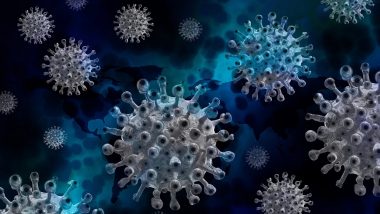New Delhi, June 15: The highly contagious B.1.6172 or the Delta variant of COVID-19, which was first detected in India and is considered one of the drivers of the second wave of coronavirus cases in the country, has further mutated to form the Delta Plus or AY.1 variant. According to a recent report on coronavirus variants by the Public Health England (PHE), the Delta Plus variant was identified in six genomes from India as of June 7. In its report, the PHE also said 63 genomes of Delta variant with the new K417N mutation have been identified so far on the global science initiative GISAID. Here's what we know so far about the Delta Plus variant of COVID-19. Coronavirus Origin Mystery: Chinese Scientist, Dubbed as 'Bat Woman', Rejects Wuhan Lab Leak Theory.
What Is Delta Plus Variant?
The Delta Plus variant or AY.1 is one of the emerging variants of Delta, said Vinod Scaria, who is a scientist at Delhi-based CSIR-Institute of Genomics and Integrative Biology (IGIB). The Delta Plus variant, Scaria said, was the result of a mutation in the spike protein of SARS-COV-2, which helps the coronavirus enter and infect the human cells.
A number of genomes are now available for the lineage AY.1 / B.1.617.2.1 from across the world. The sequences are mostly from Europe, Asia and America. The travel histories are not readily available to make assumptions. pic.twitter.com/CfoOTMNbnG
— Vinod Scaria (@vinodscaria) June 13, 2021
Countries Where Delta Plus Variant Was Found:
The PHE has identified a few cases of the Delta Plus variant in England. A majority of these cases were associated with travel (countries of travel include Nepal, Turkey, Malaysia and Singapore), said Bani Jolly, a scientist specialising in genomic sequencing. According to outbreak.info, besides India, the sequences also came from the US, Canada, United Kingdom, Russia, Japan, Portugal, Poland, Turkey, Nepal and Switzerland.
We can see from the phylogeny that there are 2 separate clades of AY.1
The small cluster on the bottom composed largely of sequences from California and a larger cluster with sequences from 8 other countries including UK, India and Nepal.https://t.co/F7IoQhfpyC
3/9 pic.twitter.com/VsadKWCFLj
— Bani Jolly (@bani_jolly) June 14, 2021
Delta Plus Variant Resistant to Famous Monoclonal Antibody Cocktail Treatment:
According to experts, the Delta Plus variant is resistant to the famous antibody cocktail jab of Casirivimab and Imdevimab. This is the same coktail jab that was given to former US President Donald Trump when he had contracted coronavirus. The treatment has been recently approved by India. Mohabbat Singh From Haryana Becomes First Person in India To Get COVID-19 Antibody Cocktail of Casirivimab and Imdevimab, Used To Treat Donald Trump.
'Delta Plus No Cause of Concern for Now'
According to pulmonologist Anurag Agarwal, the Director of CSIR-IGIB, there is no cause of concern due to the Delta Plus variant in India as of now. Speaking to news agency PTI, Agarwal underlined that blood plasma from fully vaccinated individuals will have to be tested against this new variant. Immunologist Vineeta Bal, who is a guest faculty at Pune's Indian Institute of Science Education and Research, told PTI that the Delta Plus variant's resistance to monoclonal antibody cocktail doesn't mean the new variant is more infectious.
"How transmissible this new variant is will be a crucial factor to determine its rapid spread or otherwise. Thus, in individuals catching infection with the new variant, it may not be a matter worth worrying," Bal was quoted as saying.
(The above story first appeared on LatestLY on Jun 15, 2021 10:36 AM IST. For more news and updates on politics, world, sports, entertainment and lifestyle, log on to our website latestly.com).













 Quickly
Quickly




















